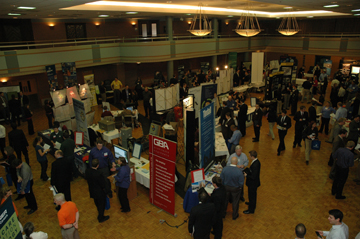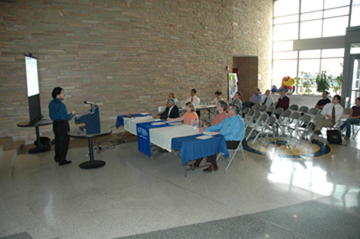School of Engineering Differential Tuition Dollars at Work
The differential tuition students pay for engineering courses helps enhance and supplement the quality of education students receive. School of Engineering faculty and staff ensure these funds are put to use to make students' time at KU more efficient and fruitful. The students themselves, through Engineering Student Council, have a say in how a portion of these dollars are spent each year, by funding numerous student projects and initiatives.
Some examples of how the differential tuition fee is used, the impact it’s had, and how it’s benefited the students over the years are:
Career Services

Funds to partially support increased staff to help ensure students make connections with employers and transition from the academic world to the professional world.
This increased staffing continues to provide more opportunities for one-to-one career advising meetings with students – the number of individual meetings with students has more than doubled (approximately twice as many) since the new differential tuition plan was initiated.
In addition to personal meetings with students, career center staff members have time to review hundreds of submitted print resumes each year.
ECC established an outreach program to employers to promote the School of Engineering and its students.
Additional staffing also allowed the career center to be open during the noon hour throughout the academic year as well as increased the information flow to students, raising awareness and promoting job-related opportunities.
Engineering Computing Services
Student fees provide support staff responsible for maintaining the school’s computer systems and providing IT security and web services to students.
Chemical and Petroleum Engineering
Supports regular and planned replacement and upgrading of computers for exclusive student use in the department’s computer teaching suite.
Supports new and upgraded software (Mathlab, ChemCad).
The replacement, addition and upgrading of equipment in the undergraduate chemical engineering and petroleum engineering teaching labs.
The petroleum engineering lab was totally refurbished in 2005 and differential tuition dollars were used to replace, add and upgrade new experiments and support development, operation and maintenance of these experiments.
The department has also purchased pre-designed laboratory education kits from a laboratory supplier and constructed new experiments in the chemical engineering unit ops teaching lab.
The replacement and addition of new machine tools in the department workshop, which are essential for the construction and maintenance of undergraduate teaching experiments, including gases and replacement parts.
The funds are also used for other department upgrades, such as improvements to study areas and furniture for student offices.
Electrical Engineering and Computer Science
Adding video conferencing in some labs.
Components for senior design projects.
General stock for electronics courses.
Software upgrades for labs and infrastructure.
Upgrade network/lab infrastructures.
Upgrade lab workstations.
Graduate Students

Twenty-one $300 travel awards for graduate students to present research at national and international conferences.
Provided $500 for engineering awards at the annual Research & Graduate Studies’ Graduate Research Competition.
Support for a visit and talk by Jorge Cham, author of the Ph.D. comic strip, “Piled Higher and Deeper.”
Support for information kick-off meeting about the Graduate Engineering Association (GEA).
Sponsored three GEA workshops that promoted professional development. One was an employer panel discussion on the job market for graduate students. Another was a thesis/dissertation workshop presented by Jim Miller, associate professor of electrical engineering and computer science. The third was a poster presentation workshop presented by Claudia Bode, assistant director for KU’s Center for Environmentally Beneficial Catalysis.
Civil, Environmental and Architectural Engineering
Purchase shop and laboratory supplies
Purchase small and large equipment to support graduate and undergraduate students experiments
Maintain and repair equipment used by undergraduate and graduate students
Purchase computer hardware and software
Purchase materials and supplies for senior project class ARCE 681
Student field trips
Aerospace Engineering
Information available soon.
Mechanical Engineering
Cover the costs to staff the machine shop and keep it open nights and weekends during peak times of the year.
Purchase machine shop equipment and tools for senior design teams.
Purchase all lab computers, printers, scanners, paper and ink.
Partial financial support for the Jayhawk Formula car and Ecohawks teams.
Hire some graduate teaching assistants and graders.
Cover a portion of the costs for students to purchase safety glasses and a machinist's set of tools for ME 307 class.
Cover costs for all equipment for lab experiments in ME 455 class.
Overall Breakdown by Percentage
58% used by engineering departments for student related expenses and salaries.
30% used by engineering IT services for student related services and purchases.
8% used by the School of Engineering for new faculty startup expenses that are student related.
4% used by Engineering Student Council (FAC) to disperse to student groups and for graduate student travel.